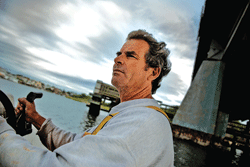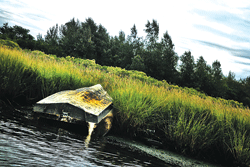>
 A boat lies abandoned in the salt marshes of Jamaica Bay. Tides prevented the volunteers from recovering the boat.
A boat lies abandoned in the salt marshes of Jamaica Bay. Tides prevented the volunteers from recovering the boat.
[Photo caption: Bill Dunphy is a volunteer mariner helping clean up Jamaica Bay.]
For years, the federally protected park in Jamaica Bay has struggled with an ongoing crisis: hundreds of boats lie abandoned in the salt marshes, where they obstruct navigation, contaminate the water and litter the shores of the nature preserve.
To combat the problem, the National Park Service, the New York State Department of Environmental Conservation and a rag-tag group of volunteer mariners have dedicated themselves to cleaning up Jamaica Bay once and for all – one boat at a time.
“It’s been a very good summer for getting boats out of the bay and really getting a handle on the problem,” John Daskalakis, the North Shore District ranger for the Jamaica Bay Unit of the National Parks Service, said.
Daskalakis estimates that more than 180 boats were scattered throughout the marshes when the operation began in April. They’ve pulled out 61.
Dubbed Operation Clean Bay, it is the latest in a long line of Jamaica Bay clean up efforts. But unlike the previous conservation attempts that focused on simply removing and disposing vessels, this cleanup has teeth.
For the first time, law enforcement is getting involved – tracing the boats to owners, issuing fines and trying to deter future dumpers.
“It’s a problem that’s going to get bigger unless we contain it,” Lt. Francisco Lopez, an investigator with the Marine Enforcement Unit at DEC, said.
The boat dumpers face up to $15,000 per day in fines for abandoned vessels and $37,000 per day if the vessel is leaking contaminants, he said.
According to Lopez, they already brought 14 cases against boat owners and are expecting many more as boats continue to be pulled from the bay.
 “This is just the tip of the iceberg,” Lopez said.
“This is just the tip of the iceberg,” Lopez said.
[Photo caption: A boat lies abandoned in the salt marshes of Jamaica Bay. Tides prevented the volunteers from recovering the boat.]
Together with local salvage companies like Sea Tow and Tow Boat USA, who volunteer their services, and with information from concerned citizens, the Clean Bay operators regularly survey the marshes for more vessels to be towed back to shore, traced and disposed of.
And while it might seem like finding a needle in a haystack among the bay’s 9,000 plus acres, a short ride through a busy channel says otherwise. On one run in a stretch of less than a mile, they spotted the remains of five small boats.
Bill Dunphy, a commercial fisherman, retired firefighter and Jamaica Bay volunteer, beached his Carolina Skiff and pushed through the tall grass towards one of the boats, washed ashore by the tides and lying dormant and stripped among the reeds. Dunphy tied a line to the boat and bailed out a pool of putrid-green water that filled the hull. Daskalakis checked for the boat’s identification number – nothing this time. They pushed the skiff back into the water, rope in hand, and pulled alongside one of the towboats. Dunphy passed the line to the towboat’s captain and with a rev of the engine, a crack of the rope and a splash, the abandoned vessel was pulled away.
“We basically did all the easy ones,” Dunphy admitted afterwards.
But for boats with severe damage or boats that are submerged in the mud and sand, the process can range from laborious and difficult to impossible for the volunteers, who provide all of the resources and manpower to remove the vessels.
Some of the boats need to be dug out and repaired before they can be towed, Dunphy said. others remain in place because they’re beyond the means of the volunteers to salvage, or pose a risk of spreading contaminants.
“We need equipment,” Dunphy lamented. “You know nobody wants to help.”
But despite the difficult work and demoralizing lack of resources, Dunphy and the other volunteers are sticking with the program. For them, it’s not about recognition or funding, it’s about doing what they can to preserve an area they cherish.
“I’ve always done commercial fishing all my life on the water,” Dunphy said. “I use the water with the kids, so all the abandoned boats don’t look good, you know. It’s not nice. I bring people, my cousins, and all they see is derelict boats, you know.”
“The oil and the grease don’t help the fishing,” he added. “If I can give a little back – why not?”
“It’s for them,” Salvatore Catapano, a Sea Tow tugboat captain and Clean Bay volunteer who grew up around the refuge, said while pointing to a crowd of small recreational boats gathered in the bay for the weekend. “That’s why we all do this. I want to see my grandkids enjoy this place, and the way it’s going right now, if somebody doesn’t do something about it, they’re not going to be able to.”
For more information about Operation Clean Bay or to report illegal dumping, call (718) 338-3718.



























